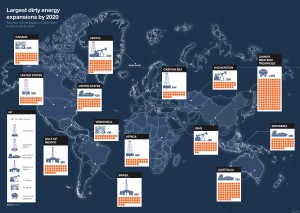Fertility in the Age of Extraction
Sep 10th, 2013 | By admin | Category: Economics and GDPBy Suzanne York, www.howmany.org
Slowly but surely, economists and other experts are beginning to see the light on the need to rethink society’s obsession with growth, be it population or economic.
Dean Baker, an economist with the Center for Economic & Policy Research, took the New York Times to task for celebrating fertility rates in the looming shadow of decreasing natural resources.The Times piece, “Fertility Rate Stabilizes as the Economy Grows” ran last week and declared “The sharp decline in the country’s fertility rate during the economic downturn has come to an end.” An improving economy means more couples are deciding to have more babies.
In a brief response titled “NYT Thinks We Should Celebrate Overcrowded Beaches and Environmental Degradation,” Baker noted the following:
The piece tells readers that higher birth rates are associated with higher economic growth. This is true, but they are not necessarily associated with higher per capita growth. Bangladesh has a higher GDP (on a PPP basis) than Denmark, but no one would say that Bangladesh is richer than Denmark. This is because Denmark has a far higher per capita GDP.
There are also many items related to population density that are not captured by GDP. For example, if people spend more time commuting because roads and infrastructure are more crowded this will not be picked by in GDP. The same is true for recreational sites like parks and beaches. Also, a larger population will make it more difficult to attain targets for reducing greenhouse gas emissions for folks who care about things like global warming.
It is time to rethink how we define societal well-being beyond endless economic growth and GDP. Humans are very innovative, but finite resources cannot be simply replaced.
There is a growing awareness that our economic structure is flawed. Certainly in the U.S. inequality is increasing, and has been for decades. And a quick look around at the natural environment reflects that it is being degraded at rapid rate. Do a Google search on water and see how many stories have been published just this summer on droughts, aquifer depletion, and water conflicts. If a community or corporation depletes an underground aquifer, it will be a very long time before it is replenished.
Long-time environmentalist Brent Blackwelder recently wrote about “The End of the Age of Extraction” and how a true cost, steady-state economy can address many of the problems we face today. He and others believe that a steady-state economic system “would prevent resource problems by maintaining population and resource consumption well within the carrying capacity of the planet.”
It is apparent that change is needed, given that in August the world consumed more resources than nature can replenish in a year.
Blackwelder noted that the global economy has not been able to reverse natural resource depletion. Unless we reverse course and move toward a true cost, sustainable economy, he wrote that nations are faced with three choices. They can:
- reject concerns about shortages and environmental decline and proceed for a few more decades with expanded drilling, mining, and harvesting;
- acknowledge the problem and adopt policies that lead to sustainable resource use and reliance on renewable energy; or
- treat the situation like a wartime crisis as President Franklin Roosevelt did in World War II when practically overnight he forced Detroit to shift from making cars to manufacturing ships and airplanes.
What the New York Times missed is that fertility rates are increasing in a world of finite resources, many of which are becoming more inaccessible (think tar sands, deep sea oil drilling).
Let’s celebrate babies, but with rights of youth and future generations in mind. What kind of world is today’s generation going to inherit? A true cost economy offers a chance to set things straight.
Suzanne York is a senior writer with the Institute for Population Studies.



